谢孟媛语法(比较)(33-37)
谢孟媛初级文法讲义(笔记)
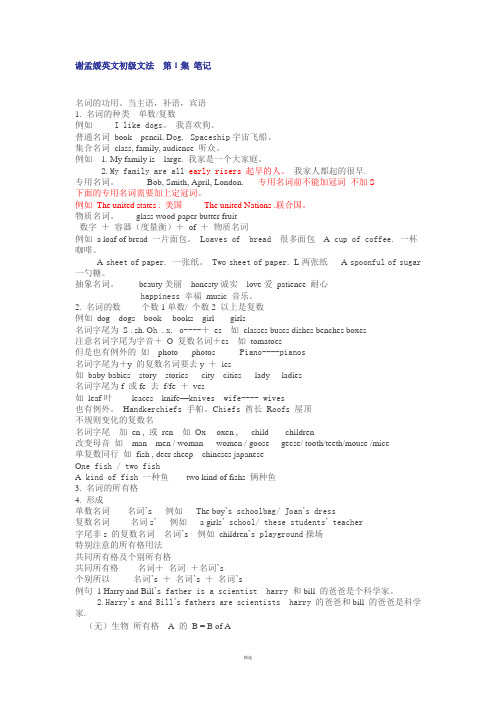
谢孟媛英文初级文法第1集笔记名词的功用。
当主语,补语,宾语1. 名词的种类单数/复数例如 I like dogs。
我喜欢狗。
普通名词book pencil. D og. S paceship宇宙飞船、集合名词class, family, audience 听众。
例如 1. My family is large. 我家是一个大家庭。
2.My family are all early risers 起早的人。
我家人都起的很早.专用名词。
--------- Bob, Smith, April, London.-----专用名词前不能加冠词不加S下面的专用名词需要加上定冠词。
例如The united states . 美国The united Nations .联合国。
物质名词。
------glass wood paper butter fruit数字+容器(度量衡)+of +物质名词例如a loaf of bread 一片面包。
L oaves of bread 很多面包A cup of coffee. 一杯咖啡。
A sheet of paper. 一张纸。
T wo sheet of paper. L两张纸A spoonful of sugar 一勺糖。
抽象名词。
-------beauty美丽honesty诚实love爱patience 耐心happiness 幸福music 音乐。
2. 名词的数-------个数1单数/ 个数2 以上是复数例如dog---dogs book ---books girl ---- girls名词字尾为S . sh. O h .x. o----+es 如classes buses dishes benches boxes注意名词字尾为字音+O 复数名词+es 如tomatoes但是也有例外的如photo---- photos P iano----pianos名词字尾为+y 的复数名词要去y +ies如baby-babies story---stories city---cities lady----ladies名词字尾为f 或fe 去f/fe +ves如leaf叶------ leaces knife—knives wife---- wives也有例外。
谢孟媛英语初级语法1 60全集新版超详细

精品文档第一集名词的功用。
当主语,补语,受词 (3)Until 2 be动词一般动词的现在时 (4)Unilt 3 be 动词一般动词的过去式 (6)第七集One/ones、Both/all、Either/neither、Other/ another、Some / any (13)第八集Unit 5 时态----动词随着时间来变化时态 (16)第九集 (17)Unit 6 wh 问句----祈使句, 感叹句。
(20)第11集 (22)第十四集不定词(To V)表身份 (28)第十五集 (29)第十六集 (31)第十七集动名词 (33)第十八集 (34)第十九集 (36)第二十集分词 (38)第二十一集 (39)第二十二集 (40)第二十三集形容词(修饰名词) (41)第二十四集 (42)第二十五集 (43)第二十六集Unit6 副词 (44)第二十七集 (45)第二十八集 (47)第二十九集unit 7 动词 (49)第三十集 (50)第三十一集现在完成式 (53)第三十二集 (53)第三十三集 (55)第三十四集 (56)第三十五集附加问句 (57)第三十六集 (59)第三十七集 (60)第三十八集被动语态 (61)第三十九集 (63)第四十集 (64)第四十一集 (65)第四十二集 (67)第四十三集关系代名词 (69)第四十四集 (69)第四十五集 (70)第四十六集 (72)第四十七集 (73)第四十八集 (75)第四十九集间接问句 (76)精品文档.精品文档第五十集 (77)第五十一集 (79)第五十二集连接词 (80)第五十三集 (81)第五十四集 (82)第五十五集 (83)第五十六集 (84)第五十七集 (85)第五十八集介系词 (86)第五十九集 (88)第六十集 (90)精品文档.精品文档谢孟媛英文初级文法第一集Unit1·名词的功用当主语,补语,受词一、名词的种类单数/复数例如I like dogs。
谢孟媛英语初级语法1-60全集新版(超详细的)

第一集名词的功用。
当主语,补语,受词 (3)Until 2 be动词一般动词的现在时 (4)Unilt 3 be 动词一般动词的过去式 (7)第七集 One/ones、Both/all、Either/neither、Other/ another、Some / any (13)第八集 Unit 5 时态----动词随着时间来变化时态 (16)第九集 (18)Unit 6 wh 问句----祈使句, 感叹句。
(21)第11集 (23)第十四集不定词( To V)表身份 (29)第十五集 (30)第十六集 (32)第十七集动名词 (34)第十八集 (35)第十九集 (38)第二十集分词 (40)第二十一集 (41)第二十二集 (42)第二十三集形容词(修饰名词) (43)第二十四集 (44)第二十五集 (45)第二十六集 Unit6 副词 (46)第二十七集 (48)第二十八集 (49)第二十九集 unit 7 动词 (51)第三十集 (53)第三十一集现在完成式 (56)第三十二集 (57)第三十三集 (58)第三十四集 (59)第三十五集附加问句 (61)第三十六集 (62)第三十七集 (63)第三十八集被动语态 (65)第三十九集 (66)第四十集 (68)第四十一集 (69)第四十二集 (71)第四十三集关系代名词 (72)第四十四集 (73)第四十五集 (74)第四十六集 (76)第四十七集 (77)第四十八集 (79)第四十九集间接问句 (80)第五十集 (82)第五十一集 (83)第五十二集连接词 (85)第五十三集 (86)第五十四集 (87)第五十五集 (88)第五十六集 (89)第五十七集 (90)第五十八集介系词 (91)第五十九集 (93)第六十集 (96)谢孟媛英文初级文法第一集 Unit1·名词的功用当主语,补语,受词一、名词的种类单数/复数例如 I like dogs。
谢孟媛_初级英文文法讲义【全】整理版——可直接打印
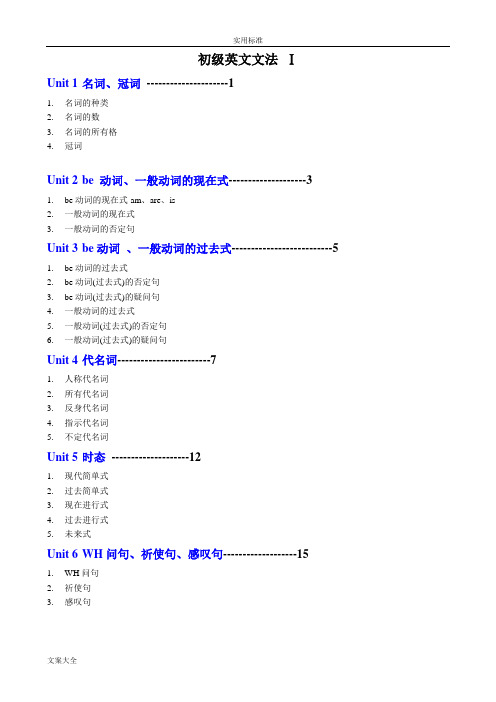
实用标准初级英文文法ⅠUnit 1 名词、冠词---------------------11.名词的种类2.名词的数3.名词的所有格4.冠词Unit 2 be 动词、一般动词的现在式--------------------31.be动词的现在式-am、are、is2.一般动词的现在式3.一般动词的否定句Unit 3 be动词、一般动词的过去式--------------------------51.be动词的过去式2.be动词(过去式)的否定句3.be动词(过去式)的疑问句4.一般动词的过去式5.一般动词(过去式)的否定句6.一般动词(过去式)的疑问句Unit 4 代名词------------------------71.人称代名词2.所有代名词3.反身代名词4.指示代名词5.不定代名词Unit 5 时态--------------------121.现代简单式2.过去简单式3.现在进行式4.过去进行式5.未来式Unit 6 WH问句、祈使句、感叹句-------------------151.WH问句2.祈使句3.感叹句Unit 1 名词、冠词名词,用来表示人或事物、动物,能做为主语、补语、受词。
其中可计数的,称为可数名词;不可计数的,称为不可数名词。
1. 名词的种类表示具有一定形状的个体,为可数名词,有单数/复数之分。
例:book(书)、pencil(铅笔)、dog(狗)、spaceship(太空船)等。
表示一个单位的群体,或者表示被视做整体的人、事、物的集合体。
例:class(班级;班上的同学)、family(家庭;家人)、audience(听众)等。
例 1. My family is large. 我家是一个大家庭。
2. My family are all early risers. 我的家人都起得早。
如人名、地名等,用来表示其一特定的名称。
无冠词,第一个字母须大写。
例:Bob(鲍伯)、Smith(史密斯)、April(四月)、London(伦敦)……等。
谢孟媛中级文法(1—120课)目录、学习笔记--详细精准、值得收藏
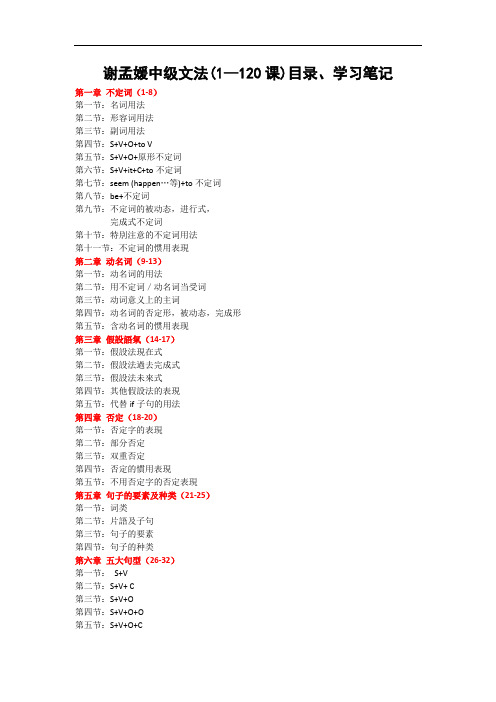
谢孟媛中级文法(1—120课)目录、学习笔记第一章不定词(1-8)第一节:名词用法第二节:形容词用法第三节:副词用法第四节:S+V+O+to V第五节:S+V+O+原形不定词第六节:S+V+it+C+to不定词第七节:seem (happen…等)+to不定词第八节:be+不定词第九节:不定词的被动态,进行式,完成式不定词第十节:特別注意的不定词用法第十一节:不定词的惯用表現第二章动名词(9-13)第一节:动名词的用法第二节:用不定词/动名词当受词第三节:动词意义上的主词第四节:动名词的否定形,被动态,完成形第五节:含动名词的惯用表现第三章假設語氣(14-17)第一节:假設法現在式第二节:假設法過去完成式第三节:假設法未來式第四节:其他假設法的表現第五节:代替if子句的用法第四章否定(18-20)第一节:否定字的表現第二节:部分否定第三节:双重否定第四节:否定的慣用表現第五节:不用否定字的否定表現第五章句子的要素及种类(21-25)第一节:词类第二节:片語及子句第三节:句子的要素第四节:句子的种类第六章五大句型(26-32)第一节:S+V第二节:S+V+ C第三节:S+V+O第四节:S+V+O+O第五节:S+V+O+C第七章比较(33-37)第一节:比较变化第二节:原级第三节:比较级第四节:最高级第八章疑问(38-40)第一节:疑问代名词第二节:疑问副词第三节:疑问形容词第四节:間接问句第五节:附加问句第六节:修辭疑问句第七节:應答疑问句第八节:敘述句型的疑问句第九章名词及冠词(41-47)第一节:名词第二节:名词的複數形第三节:名词的所有格第四节:冠词第五节:定冠词的用法第六节:冠词特別注意的用法第十章介系词(48-53)第一节:介系词的受词第二节:介系词的位置第三节:群体介系词第四节:双重介系词第五节:常見的介系词用法第六节:和形容词,动词結合的介系词第十一章关系词(54-60)第一节:关系代名词的种类和格第二节:关系代名词的用法第三节:限定用法和非限定用法第四节:关系副词第五节:复合关系词第六节:关系形容词及as, but, than第十二章形容词、副词(61-68)第一节:形容词第二节:副词第十三章分词(69-74)第一节:修饰名词的现在分词第二节:修饰名词的过去分词第三节:S+V+C(分词)第四节:S+V+O+C(分词)第五节:分词构句第六节:分词构句的被动態,完成形,否定形第七节:独立分词构句第八节:with+(代)名词+分词第九节:分词构句的惯用表現第十四章被动语态(75-80)第一节:主被动语态转换第二节:(SVOO)的被动语态第三节:(SVOC)的被动语态第四节“疑问句被动语态第五节:祈使句的被动语态第六节:Say, believe, expect, know, think,consider等的被动语态第七节:特別注意的被动语态第十五章助动词(81-85)第一节:助动词的特徵第二节:助动词的用法第三节:含助动词的慣用表現第十六章特殊构句(86-91)第一节:倒装第二节:强调第三节:省略第四节:插入第五节:同位語第十七章代名词(92-100)第一节:人稱代名词第二节:指示代名词第三节:不定代名词第十八章时态(101-107)第一节:現在式第二节:過去式第三节:未來式第四节:現在进行式第五节:過去进行式第六节:未來进行式第七节:現在完成式第八节:過去完成式第九节:未來完成式第十节:完成进行式第十九章时态的一致與敘述法(108-113)第一节:时态的一致第二节:敘述法第二十章连接词(114-120)第一节:对等连接词第二节:从属连接词(1)第三节:各种从属连接词(副词子句)的意义不定词〈第01卷〉名词用法(1)不定词的用法名词用法形容词用法副词用法不定词无非就是比较长的名词、形容词、副词而已,因为它有两个字。
谢孟媛初级文法讲义1-60讲!-推荐下载

谢孟媛初级文法讲义(1-30课)谢孟媛英文初级文法第1集笔记名词的功用。
当主语,补语,受词1. 名词的种类单数/复数普通名词 book pencil. dog. Spaceship宇宙飞船、例如 I like dogs。
我喜欢狗。
集合名词 class, family, audience 听众。
例如 1. My family is large. 我家是一个大家庭。
2.My family are all early risers 起早的人。
我家人都起的很早.专用名词。
------ Bob, Smith, April, London. 专用名词前不能加冠词、后面不加S。
下面的专用名词需要加上定冠词。
例如 The united states . 美国 The united Nations .联合国。
物质名词---glass glasses wood woods paper newspaper butter fruitmeat sugar air gas water数字+容器(度量衡)+ of +物质名词例如 a loaf of bread 一片面包。
Loaves of bread 很多面包a cup of coffee. 一杯咖啡。
Two cups of coffee.a sheet of paper. 一张纸。
Sheep(绵羊) Two sheets of paper. 两张纸a spoonful of sugar 一勺糖。
a kind of fish 一种鱼抽象名词-------beauty美丽 honesty诚实 love爱 live居住 life(生活) patience 耐心happy幸福的 happiness 幸福 music 音乐。
2. 名词的数-------个数1单数/ 个数2 以上是复数(七种变化)1、例如 dog---dogs book ---books girl ---- girls2、名词字尾为 s. sh. ch .x. o----+ es 如 classes buses dishes benches boxes注意名词字尾为字音+ O 复数名词+es 如tomato---tomatoes也有例外的如 photo---- photos phone(电话) Piano----pianos3、名词字尾为+y 的复数名词要去y + ies如 baby-babies boy(男孩) cowboy(牛仔) story(小说)---stories city---cities lady----ladies4、名词字尾为f 或fe 去 f/fe + ves如 leaf叶------ leaves knife—knives wife---- wives也有例外。
谢孟媛英文初级文法全集笔记完美版

名词的功用。
当主语,补语,受词1. 名词的种类单数/复数普通名词 book pencil. Dog. Spaceship宇宙飞船、集合名词 class, family, audience 听众。
例如 1. My family is large. 我家是一个大家庭。
2. My family are all early risers 起早的人。
我家人都起的很早. 专用名词 Bob, Smith, April, London.-----专用名词前不能加冠词不加S 下面的专用名词需要加上定冠词。
The united states . 美国 The united Nations .联合国。
物质名词 glass wood paper butter fruit数字+容器(度量衡)+ of +物质名词a loaf of bread 一片面包。
Loaves of bread 很多面包A cup of coffee. 一杯咖啡。
A sheet of paper. 一张纸。
Two sheets of paper.两张纸 A spoonful of sugar 一勺糖。
抽象名词 beauty美丽 honesty诚实 love爱 patience 耐心happiness 幸福 music 音乐。
2. 名词的数单数/ 个数2 以上是复数名词字尾加s 大多数 dog dogs book books girl girls名词字尾为 s.sh.ch.x.o加es classes buses dishes benches boxes名词字尾为子音加o,加es 如tomatoes 例外photos pianos名词字尾为+y 的复数名词要去y + iesbaby-babies story-stories city-cities lady-ladies名词字尾为 f 或fe 去f/fe +ves 如leaf-leaves knife-knives wife-wives例外handkerchiefs chiefs roofs不规则变化的复数名名词字尾加 en , 或 ren 如 Ox-oxen , child-children改变母音如man-men woman-women goose-geese tooth-teeth mouse-mice单复数同形如 fish deer sheep chineses japaneseOne fish two fish(个) a kind of fish two kinds of fishes(种)3. 名词的所有格单数名词:名词's 例如 The boy's schoolbag/ Joan's dress复数名词:名词s' 例如 a girls' school/ these students' teacher 字尾非s 的复数名词:名词's 例如 children's playground操场特别注意的所有格用法共同所有格:名词+名词+名词's个别所有格:名词's+名词's+名词's1 Harry and Bill's father is a scientist2.Harry's and Bill's fathers are scientists(无)生物所有格: A的B B of Athe legs of the table the door of the carthe girl's name有生命的东西可以这样用 the name of the girl 所有格之后的名词如在句中非常容易理解时可以省略1. she's going to the dentist's2. I met him at the barber's(shop)3. We like to eat lunch at McDonald's. 我们在麦当老吃午餐。
谢孟媛中级英语语法讲义笔记-(新版)
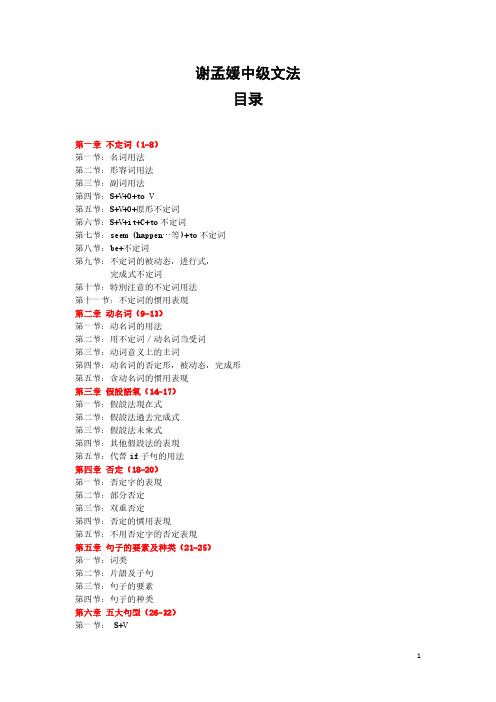
第二节:修饰名词的过去分词 第三节:S+V+C(分词) 第四节:S+V+O+C(分词) 第五节:分词构句 第六节:分词构句的被动態,
完成形,否定形 第七节:独立分词构句 第八节:with+(代)名词+分词 第九节:分词构句的惯用表現 第十四章 被动语态(75-80) 第一节:主被动语态转换 第二节: (SVOO)的被动语态 第三节: (SVOC)的被动语态 第四节“疑问句被动语态 第五节:祈使句的被动语态 第六节:Say, believe, expect, know, think,consider 等的被动语态 第七节:特別注意的被动语态 第十五章 助动词(81-85) 第一节:助动词的特徵 第二节:助动词的用法 第三节:含助动词的慣用表現 第十六章 特殊构句(86-91) 第一节:倒装 第二节:强调 第三节:省略 第四节:插入 第五节:同位語 第十七章 代名词(92-100) 第一节:人稱代名词 第二节:指示代名词 第三节:不定代名词 第十八章 时态(101-107) 第一节:現在式 第二节:過去式 第三节:未來式 第四节:現在进行式 第五节:過去进行式 第六节:未來进行式 第七节:現在完成式 第八节:過去完成式 第九节:未來完成式 第十节:完成进行式 第十九章 时态的一致與敘述法(108-113) 第一节:时态的一致
2. Give me something to eat. 翻译:(你)给我些吃的。 to eat 是修饰 something ,修饰名词的具有形容词的功能。
中英文差异
一个美丽的女孩 a beautiful girl 这个刚好是中英文顺序一致,但是这样的概率不到 20%;
一个站在门口的女孩 a girl standing at the door 一个字的形容词可以放在名词前面,多个字的形容词就要放在名词后面, 所以不定词是两个字的形容词要放在名词的后面。
谢孟媛文法目录(配合网上视频)
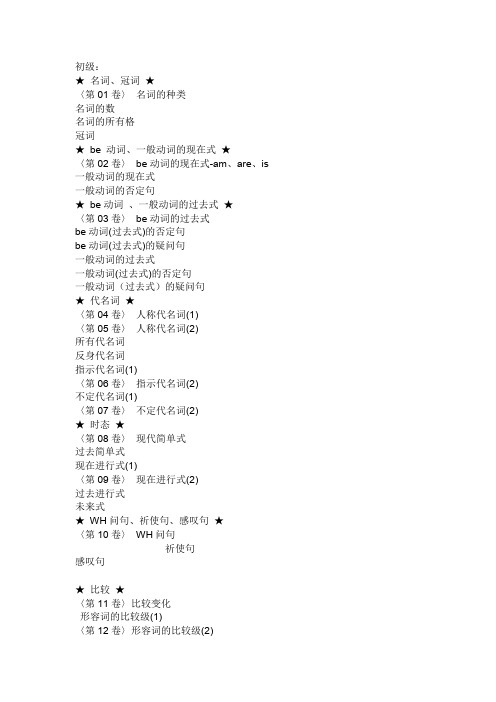
叙述句型的疑问句 ★名词及冠词★ 41 〈第 01 卷〉名词(1) 42 〈第 02 卷〉名词(2) 43 〈第 03 卷〉名词(3) 44 〈第 04 卷〉名词(4)、名词的复数形(1) 45 〈第 05 卷〉名词的复数形(2)、名词的所有格(1) 46 〈第 06 卷〉名词的所有格(2)、冠词(1) 47 〈第 07 卷〉冠词(2)、定冠词的用法、冠词特别注意的用法 ★介系词★ 48 〈第 08 卷〉介系词的受词、介系词的位置(1) 49 〈第 09 卷〉介系词的位置(2)、群体介系词、双重介系词、
谢孟媛 中级文法 共 120 集
集数 内 容 ★不定词★ 1 〈第 01 卷〉名词用法(1) 2 〈第 02 卷〉名词用法(2)、 形容词用法 3 〈第 03 卷〉副词用法(1) 4 〈第 04 卷〉副词用法(2)、S+V+O+to V (1) 5 〈第 05 卷〉S+V+O+to V (2)、S+V+O+原形不定词、S+V+it+C+to 不定词 6 〈第 06 卷〉seem (happen…等)+to 不定词、be+不定词(1) 7 〈第 07 卷〉be+不定词(2)、不定词的被动态,进行式,完成式不定词 8 〈第 08 卷〉特别注意的不定词用法、不定词的惯用表现 ★动名词★ 9 〈第 09 卷〉动名词的用法(1) 10 〈第 10 卷〉动名词的用法(2)、用不定词/动名词当受词(1) 11 〈第 11 卷〉用不定词/动名词当受词(2)、动词意义上的主词(1) 12 〈第 12 卷〉动词意义上的主词(2)、动名词的否定形,被动态,完成
(word完整版)谢孟媛英语初级语法1-60全集新版(超详细)

第一集名词的功用。
当主语,补语,受词 (3)Until 2 be动词一般动词的现在时 (4)Unilt 3 be 动词一般动词的过去式 (6)第七集One/ones、Both/all、Either/neither、Other/ another、Some / any (13)第八集Unit 5 时态----动词随着时间来变化时态 (16)第九集 (17)Unit 6 wh 问句----祈使句, 感叹句。
(20)第11集 (22)第十四集不定词(To V)表身份 (28)第十五集 (29)第十六集 (31)第十七集动名词 (33)第十八集 (34)第十九集 (36)第二十集分词 (38)第二十一集 (39)第二十二集 (40)第二十三集形容词(修饰名词) (41)第二十四集 (42)第二十五集 (43)第二十六集Unit6 副词 (44)第二十七集 (45)第二十八集 (47)第二十九集unit 7 动词 (49)第三十集 (50)第三十一集现在完成式 (53)第三十二集 (53)第三十三集 (55)第三十四集 (56)第三十五集附加问句 (57)第三十六集 (59)第三十七集 (60)第三十八集被动语态 (61)第三十九集 (63)第四十集 (64)第四十一集 (65)第四十二集 (67)第四十三集关系代名词 (69)第四十四集 (69)第四十五集 (70)第四十六集 (72)第四十七集 (73)第四十八集 (75)第四十九集间接问句 (76)第五十集 (77)第五十一集 (79)第五十二集连接词 (80)第五十三集 (81)第五十四集 (82)第五十五集 (83)第五十六集 (84)第五十七集 (85)第五十八集介系词 (86)第五十九集 (88)第六十集 (90)谢孟媛英文初级文法第一集Unit1·名词的功用当主语,补语,受词一、名词的种类单数/复数例如I like dogs。
我喜欢狗。
谢孟媛_初级英文文法_讲义
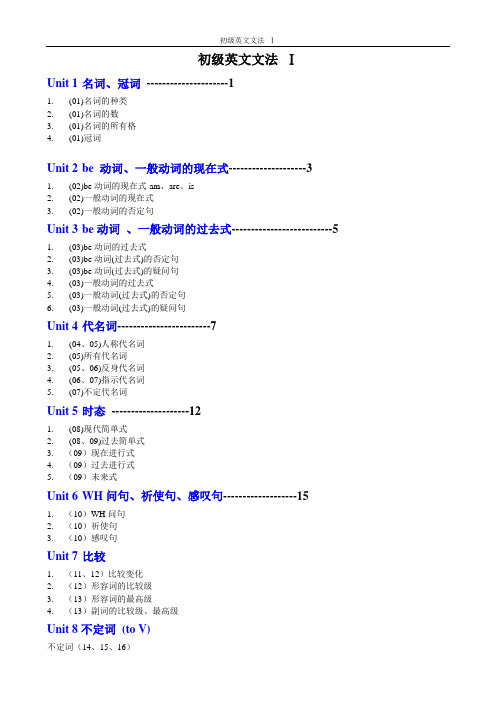
初级英文文法Ⅰ初级英文文法ⅠUnit 1 名词、冠词---------------------11.(01)名词的种类2.(01)名词的数3.(01)名词的所有格4.(01)冠词Unit 2 be 动词、一般动词的现在式--------------------31.(02)be动词的现在式-am、are、is2.(02)一般动词的现在式3.(02)一般动词的否定句Unit 3 be动词、一般动词的过去式--------------------------51.(03)be动词的过去式2.(03)be动词(过去式)的否定句3.(03)be动词(过去式)的疑问句4.(03)一般动词的过去式5.(03)一般动词(过去式)的否定句6.(03)一般动词(过去式)的疑问句Unit 4 代名词------------------------71.(04、05)人称代名词2.(05)所有代名词3.(05、06)反身代名词4.(06、07)指示代名词5.(07)不定代名词Unit 5 时态--------------------121.(08)现代简单式2.(08、09)过去简单式3.(09)现在进行式4.(09)过去进行式5.(09)未来式Unit 6 WH问句、祈使句、感叹句-------------------151.(10)WH问句2.(10)祈使句3.(10)感叹句Unit 7 比较1.(11、12)比较变化2.(12)形容词的比较级3.(13)形容词的最高级4.(13)副词的比较级、最高级Unit 8不定词(to V)不定词(14、15、16)Unit 9动名词动名词(17、18、19)Unit 10 分词分词(20、21、22)Unit 11形容词形容词23、24、25)Unit12 副词副词(26、27、28)Unit13 动词动词(29、30)Unit 14 现在完成式1.(31)现在完成式的形式→have/has+过去分词2.(32)现在完成式的否定句及疑问句3.(32、33)现在完成式的使用时机4.(34)特别注意的现在完成式Unit 15问句1.(35)附加问句的形式2.(35、36、37)特别注意的附加问句Unit 16语态1.(38)主动及被动2.(38)被动语态的形式→主词+be V+过去分词+by+行为者3.(38)主动及被动的转换4.(38、39)各时态的被动语态形式5.(39、40)各句型的被动语态形式6.(41、42)特别注意的被动语态Unit 17代名词1.(43)关系代名词的功用→连接词+代名词2.(43)关系代名词的种类3.(44、45)主格的关系代名词4.(45、46)所有格的关系代名词5.(46、47)受格的关系代名词6.(47)特别注意的关系代名词7.(48)修饰名词的字、词组、子句Unit 18问句1.(49)直接问句及间接问句2.(50、51)间接问句的形成3.(51)特别注意的间接问句Unit 19词1.(52)连接词的功能2.(52、53、54、55、56、57)连接词总类Unit 20词1.(58)介系词的功能2.(58)表示时间的介系词3.(59、60)表示地点的介系词4.重要的介系词Unit 1 名词、冠词名词,用来表示人或事物、动物,能做为主语、补语、受词。
谢孟媛初级文法讲义全(重点用多种颜色标出)

名词的功用。
当主语,补语,受词1. 名词的种类单数/复数例如 I like dogs。
我喜欢狗。
普通名词 book pencil. Dog. Spaceship宇宙飞船、集合名词 class, family, audience 听众。
例如 1. My family is large. 我家是一个大家庭。
2.My family are all early risers 起早的人。
我家人都起的很早.专用名词。
--------- Bob, Smith, April, London.-----专用名词前不能加冠词不加S下面的专用名词需要加上定冠词。
例如 The united states . 美国 The united Nations .联合国。
物质名词。
------glass wood paper butter fruit数字+容器(度量衡)+ of +物质名词例如 a loaf of bread 一片面包。
Loaves of bread 很多面包 A cup of coffee. 一杯咖啡。
A sheet of paper. 一张纸。
Two sheet of paper. L两张纸 A spoonful of sugar 一勺糖。
抽象名词。
-------beauty美丽 honesty诚实 love爱 patience 耐心happiness 幸福 music 音乐。
2. 名词的数-------个数1单数/ 个数2 以上是复数例如 dog---dogs book ---books girl ---- girls名词字尾为 S . sh. Oh .x. o----+ es 如 classes buses dishes benches boxes注意名词字尾为字音+ O 复数名词+es 如 tomatoes但是也有例外的如 photo---- photos Piano----pianos名词字尾为+y 的复数名词要去y + ies如 baby-babies story---stories city---cities lady----ladies名词字尾为f 或fe 去 f/fe + ves如 leaf叶------ leaces knife—knives wife---- wives也有例外。
谢孟媛语法(比较)(33-37)鄙视积分不看后悔版
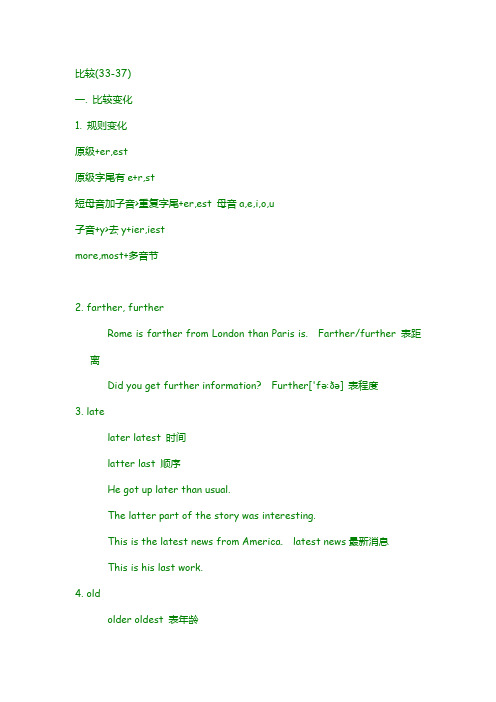
比较(33-37)一. 比较变化1. 规则变化原级+er,est原级字尾有e+r,st短母音加子音>重复字尾+er,est 母音a,e,i,o,u子音+y>去y+ier,iestmore,most+多音节2. farther, furtherRome is farther from London than Paris is. Farther/further 表距离Did you get further information? Further['fə:ðə] 表程度3. latelater latest 时间latter last 顺序He got up later than usual.The latter part of the story was interesting.This is the latest news from America. latest news最新消息This is his last work.4. oldolder oldest 表年龄elder eldest 表长幼He is older than I.My elder(长辈)/older(老) brother is in Taipei.二. 原级比较1. Sports are as important as studies.He is as nice a person as his father.2. He does not work as/so hard as his brother (does).This Japanese-video game is not as/so expensive as the Taiwanese-one.3. She has as many dresses as her sister (does).I don’t know as many people as she (does).4. …times as…as…The bridge is twice as long as that one.=That bridge is half as long as this one.Imported books cost three times as much as Taiwanese books.cost v.价值Taiwanese books cost one tried as much as imported books.<注意>可以用length (long), width (wide),height (high),weight (heavy) ,depth (deep),size (large, big)This box is one quarter as large as that one.=This box is one quarter the size of that one.5. As…as poss ible/one canCall the police as soon as possible/you can.as soon as possible (a.s.a.p)soon 时间快quick/quickly 速度快I told him to come home as early as possible/he could.As…as 惯用片语as busy as a bee 非常忙碌as cool as a cucumber 极端冷静as cunning as a fox 十分狡猾cunning ['kʌniŋ] adj. 狡猾的;可爱的;巧妙的as dead as a doornail 了无声息/完全(或肯定、确实无疑地)死了的,确已僵死了的doornail ['dɔ:nei] n. 门钉,大头钉子nail n. 指甲;钉子as flat as a pancakeflat [flæt] adj. 平坦的pancake ['pænkeik] n. 煎饼as sweet as honey 非常甜美as like as two peaspea [pi:] n. [植]豌豆特殊句型6. Not so much… as… 与其说…不如说…It was not so much a crime as a mistake.=It was rather a mistake than a crime.=It was a mistake rather than a crime.7. Not so much as…/without so much as… 连…也没有The man didn’t so much as apologize to me.did n’t apologize 用原形He left me without so much as saying thanks.without saying 用VIng8. As…as ever 依然She looks as happy as everHe is as great an artist as ever lived.everDid you ever go fishing? 你曾经钓过鱼吗?Do you ever go fishing (in you free time)? 你平常钓鱼吗?9. As…as any+单数名词和任何人一样He is as hardworking as any (person) in the village.person 可省10. As many/much as+数词多达…As many as fifty thousand birds spend the winter here.I paid as much as 200 dollars for this sweater.11. “多达”的其他表现Radio broadcasting started as early as 1920.He goes to movies as often as three times a month.12. As many/much… 同数的,同量的I found six mistakes in as many lines.The tour group visited five cities in as many days.13. As good as… 几乎等于… 非褒义This house is a great buy. It’s as go od as new.This house is a great buy. 买对了His car is as good as a piece of junk. 像垃圾一样垃圾贬义三. 比较级比较1. ThanDogs are cleverer than cats.表全体狗: a dog/dogsShe can speak English better than I/me/I can. 副词比较级2. …the 比较级of the two 两者中较This guitar is the better of the two.3. 强调比较级much/many, even, far, by far, far and away, a lot/lots, ~得多still, 更加地a good deal, a great deal, 相当地somewhat rather, 稍微a bit, a little bit, a little 一点点large 容量大big 体积大大份薯条用large1. His house is much larger than mine.“大”是抽象用much强调2. You will find many more amusements in big cities than small towns.“游乐场”是可数用many强调4. 劣等比较~less 原级than ~ ~比~较不Going by bus is less expensive than going by taxi.=Going by bus is not as expensive as going by taxi.=Going by taxi is more expensive than going by bus.Instant noodles are less nutritious than rice.instant food 速熟食品fast food 速买食品5. 省略thanI have to study English harder this year because I’m a third yearstudent. 三年级学生Why don’t you use a sharper knife?重要表现6. More~than… 与其…不如~She was more sad than angry.她是难过It is more flattery than praise.与其说是称赞不如说是讨好形容词不管是单音节或多音节,都用more+adj.形式flattery ['flætəri]7. 比较级and比较级越来越…It’s getting darker and darker.Entrance exams are becoming more and more difficult.8. The 比较级…,the比较级… 越…就越…The order we grow, the weaker our memory becomes.The longer I waited, the less patient I become.The more we get together, the happier we will be.The more time you have, the more work you can do.9. (all)the比较级for+名词/because~ 因为~因此便….We respect him (all) the more for his honesty.We respect him (all) the more because he is honest.因为诚实我们更尊敬他She works all the harder because she is a mother.因为身为人母,他更努力工作.注意负面时He worked none the harder because he became a father.虽说成为父亲但并不代表会更努力工作.None the比较级for+名词/because~ 因为~因此便….10. Much less… 更不用说I don’t like mathematics, much less physics.Mathematics is hard. 一个科目,单数名词The old man cannot even work, much less run.11. Superior to~, senior to~本身含有比较含有的单词,不可用than,改用toSuperior, inferior 优秀的,拙劣的[sju:'piriə] [in'fiəriə]My inferiors 我的晚辈Senior, junior 年长的,年幼的Major, minor (程度)较大的,较小的['mainə]Prior, posterior 前面的,后面的['praiə] [pɔ'stiəriə]Postwar 战后He is five years older than I=He is five years senior to me.=He is senior to me by five years.I prefer playing sports to watching them.Prefer 动词哦12. More or less, sooner or laterOur guess was more or less correct.more or less adv.多多少少Sooner or later you will find your missing child.13. Know better than~(toVR) 不会傻到Had better~(VR) 最好~I know better than to go sailing without a life jacket.You had better not go.14. No more than等no和notI have no money.I don’t have any money.No=not any1. No more than = only 只有~而已I have no more than 100 dollars.我有100元,再没有其他了>只有2. Not more than = at most 顶多~I have not more than 100 dollars.我没有更多100元>顶多3. No less than = as much as 有~之多I have no less than 100 dollars.我有100元,再没有更少的了>我有100耶!4. Not less than = at least 至少I have not less than 100 dollars.我没有少于100元.>至少15. No more~ than~ 等1. No more~ than~ 和~一样不I am no more mad than you are.我和你一样少疯>不疯2. Not more~ than~ 不像~那样~I am not more mad than you are.我不比你多疯>没你疯3. No less~ than~ 与~同样地~I am no less mad than you are.我和你一样多疯>很疯4. Not less~ than~ 与~有过之而无不及I am not less mad than you are我不比你少疯>半斤&八两四. 最高级A. 最高级+in~/of~/that+S+V1. February is the shortest of all the months.2. He drives (the) most carefully of us all.副词最高级the常省3. This is the finest view that I’ve ever seen.4. Picasso is one of the most famous painters of the 20th century.毕加索5. This is the tried most popular song in the hit chart this week.最受欢迎中的第三B. 强调最高级Very, much, by far, far and away1. She is much/by far/far and away the best singer in the country.She is the very best singer in the country.C. The的省略1. 同一人事物不加theThis lake is the deepest in Japan.This lake is deepest here. 此湖这里最深The air in this area is the cleanest in Japan.The air in this area is cleanest when the factories are closed.2. 叙述用法不加theI am happy. 叙述用法I am a happy girl. 补述用法补了happyI feel happ iest when I’m with my friend.也可理解为同一人不加theD. 三级互换Bob is more handsome than any other boy in my class.=No other boy in my class is more handsome than Bob.=No other boy in my class is as handsome as Bob.因为我们班包括Bob所以加other重要表现E. Even+最高级甚至连…1. Even the richest man in the world can’t buy her heart.2. Even the most talented student in our class wasn’t able to answer it.F. At best/at the best, at most/at the most 顶多It will take at (the) most/best three hours to reach out destination.注意at one’s be atThe plum blossoms there are now at their best.bloom [blu:m] .n :花in bloom 盛开(指花). v :1.看上去很健康例:Jane is positively blooming with health these days.简这些日子以来身体确实健康起来2.开花。
谢孟媛初级文法讲义(笔记) (修复的)

谢孟媛英文初级文法第1集笔记Unit1 名词名词的功用:当主语,补语,宾语1. 名词的种类(单数/复数)例:I like dogs. 我喜欢狗。
普通名词:book / pencil/ dog/ spaceship宇宙飞船集合名词:class / family/ audience 听众例1. My family is large. 我家是一个大家庭。
2. My family are all early risers.我家人都起的很早.专用名词:Bob/ Smith/ April/ London. 专用名词前不能加冠词,不加s下面的专用名词需要加上定冠词例: The United States 美国The United Nations .联合国物质名词:glass/ wood/ paper/ butter/ fruit数字+容器(度量衡)+of +物质名词例: a loaf of bread 一片面包loaves of bread 很多面包 a cup of coffee 一杯咖啡a sheet of paper. 一张纸two sheets of paper两张纸 a spoonful of sugar 一勺糖抽象名词:beauty美丽/ honesty诚实/ love爱/ patience 耐心/ happiness 幸福/ music 音乐2. 名词的数---- 单数:个数为1 复数:个数为2及以上规则变化的复数名词名词字尾+s ,大部分名词例:dog---dogs book ---books girl ---- girls名词字尾为s/sh/ch/x/o复数名词+es 如: classes, buses, dishes, benches, boxes, dishes注意名词字尾为子音+o, 复数名词+es 如tomatoes但是也有例外的如photo---- photos Piano----pianos名词字尾为子音+y, 复数名词要去y +ies如baby-babies story---stories city---cities lady----ladies名词字尾为f 或fe 去f/fe +ves如:leaf叶---- leaves knife ---- knives wife ---- wives也有例外: handkerchiefs 手帕chiefs 首领,领袖roofs 屋顶不规则变化的复数名词名词字尾加en / ren 如Ox ---oxen , child----- children改变母音,如:man---men / woman --- women / goose----geese 鹅/ tooth---teeth / mouse---mice 单复数同形,如:fish , deer, sheep chineses japaneseone fish / two fisha kind of fish 一种鱼two kinds of fishes 两种鱼3. 名词的所有格形成:单数名词== 名词’s 例: t he boy’s schoolbag/ Joan’s dress复数名词== 名词s’ 例: a girls’ school/ these students’ teacher字尾非s 的复数名词== 名词’s 例如children’s playground操场特别注意的所有格用法: 共同所有格及个别所有格共同所有格---- 名词+名词+名词’s个别所有格---- 名词’s +名词’s +名词’s例1. Harry and Bill’s father is a scientist. Harry 和Bill 的爸爸是个科学家。
谢孟媛英语初级语法全集新版超详细
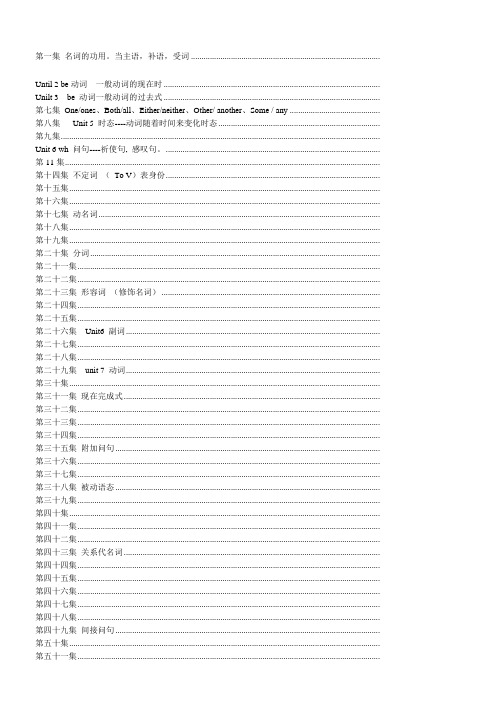
第一集名词的功用。
当主语,补语,受词 ..........................................................................................Until 2 be动词一般动词的现在时 ....................................................................................................... Unilt 3 be 动词一般动词的过去式 ....................................................................................................... 第七集One/ones、Both/all、Either/neither、Other/ another、Some / any ........................................... 第八集Unit 5 时态----动词随着时间来变化时态............................................................................. 第九集........................................................................................................................................................ Unit 6 wh 问句----祈使句, 感叹句。
...................................................................................................... 第11集...................................................................................................................................................... 第十四集不定词(To V)表身份...................................................................................................... 第十五集.................................................................................................................................................... 第十六集.................................................................................................................................................... 第十七集动名词...................................................................................................................................... 第十八集.................................................................................................................................................... 第十九集.................................................................................................................................................... 第二十集分词.......................................................................................................................................... 第二十一集................................................................................................................................................ 第二十二集................................................................................................................................................ 第二十三集形容词(修饰名词) ........................................................................................................ 第二十四集................................................................................................................................................ 第二十五集................................................................................................................................................ 第二十六集Unit6 副词......................................................................................................................... 第二十七集................................................................................................................................................ 第二十八集................................................................................................................................................ 第二十九集unit 7 动词......................................................................................................................... 第三十集.................................................................................................................................................... 第三十一集现在完成式.......................................................................................................................... 第三十二集................................................................................................................................................ 第三十三集................................................................................................................................................ 第三十四集................................................................................................................................................ 第三十五集附加问句.............................................................................................................................. 第三十六集................................................................................................................................................ 第三十七集................................................................................................................................................ 第三十八集被动语态.............................................................................................................................. 第三十九集................................................................................................................................................ 第四十集.................................................................................................................................................... 第四十一集................................................................................................................................................ 第四十二集................................................................................................................................................ 第四十三集关系代名词.......................................................................................................................... 第四十四集................................................................................................................................................ 第四十五集................................................................................................................................................ 第四十六集................................................................................................................................................ 第四十七集................................................................................................................................................ 第四十八集................................................................................................................................................ 第四十九集间接问句.............................................................................................................................. 第五十集.................................................................................................................................................... 第五十一集................................................................................................................................................第五十二集连接词................................................................................................................................ 第五十三集................................................................................................................................................ 第五十四集................................................................................................................................................ 第五十五集................................................................................................................................................ 第五十六集................................................................................................................................................ 第五十七集................................................................................................................................................ 第五十八集介系词.................................................................................................................................. 第五十九集................................................................................................................................................ 第六十集....................................................................................................................................................谢孟媛英文初级文法第一集Unit1·名词的功用当主语,补语,受词一、名词的种类单数/复数例如I like dogs。
谢孟媛英语初级语法全集新版超详细
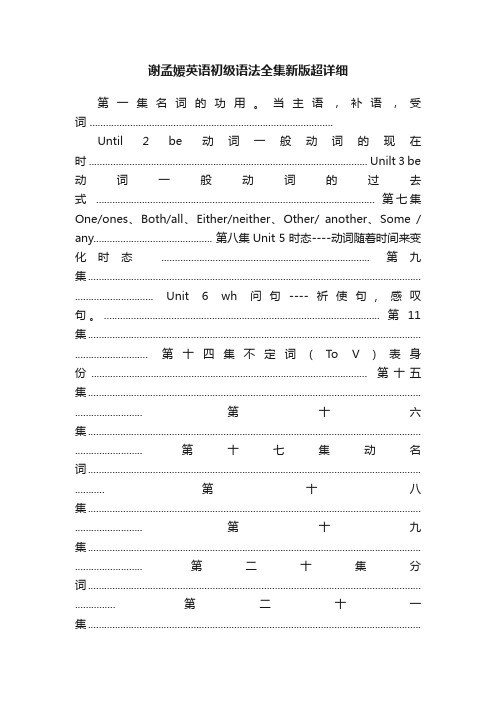
谢孟媛英语初级语法全集新版超详细第一集名词的功用。
当主语,补语,受词 ..........................................................................................Until 2 be动词一般动词的现在时 ....................................................................................................... Unilt 3 be 动词一般动词的过去式....................................................................................................... 第七集One/ones、Both/all、Either/neither、Other/ another、Some / any............................................ 第八集Unit 5 时态----动词随着时间来变化时态............................................................................. 第九集........................................................................................................................... ............................. Unit 6 wh 问句----祈使句, 感叹句。
...................................................................................................... 第11集........................................................................................................................... ........................... 第十四集不定词(T o V)表身份...................................................................................................... 第十五集........................................................................................................................... ......................... 第十六集........................................................................................................................... ......................... 第十七集动名词........................................................................................................................... ........... 第十八集........................................................................................................................... ......................... 第十九集........................................................................................................................... ......................... 第二十集分词........................................................................................................................... ............... 第二十一集...........................................................................................................................集........................................................................................................................... ..................... 第二十三集形容词(修饰名词) ........................................................................................................ 第二十四集........................................................................................................................... ..................... 第二十五集........................................................................................................................... ..................... 第二十六集Unit6 副词......................................................................................................................... 第二十七集........................................................................................................................... ..................... 第二十八集........................................................................................................................... ..................... 第二十九集unit 7 动词......................................................................................................................... 第三十集........................................................................................................................... ......................... 第三十一集现在完成式 .......................................................................................................................... 第三十二集........................................................................................................................... ..................... 第三十三集........................................................................................................................... ..................... 第三十四集........................................................................................................................... ..................... 第三十五集附加问句 .......................................................................................................................... .... 第三十六集...........................................................................................................................集........................................................................................................................... ..................... 第三十八集被动语态 .......................................................................................................................... .... 第三十九集........................................................................................................................... ..................... 第四十集........................................................................................................................... ......................... 第四十一集........................................................................................................................... ..................... 第四十二集........................................................................................................................... ..................... 第四十三集关系代名词 .......................................................................................................................... 第四十四集........................................................................................................................... ..................... 第四十五集........................................................................................................................... ..................... 第四十六集........................................................................................................................... ..................... 第四十七集........................................................................................................................... ..................... 第四十八集........................................................................................................................... .....................第四十九集间接问句 .......................................................................................................................... .... 第五十集........................................................................................................................... ......................... 第五十一集........................................................................................................................... ..................... 第五十二集连接词 .......................................................................................................................... ...... 第五十三集........................................................................................................................... ..................... 第五十四集........................................................................................................................... ..................... 第五十五集........................................................................................................................... ..................... 第五十六集........................................................................................................................... ..................... 第五十七集........................................................................................................................... ..................... 第五十八集介系词 .......................................................................................................................... ........ 第五十九集........................................................................................................................... ..................... 第六十集........................................................................................................................... .........................谢孟媛英文初级文法第一集Unit1·名词的功用当主语,补语,受词一、名词的种类单数/复数例如I like dogs。
【免费下载】谢孟缓文法讲义目录
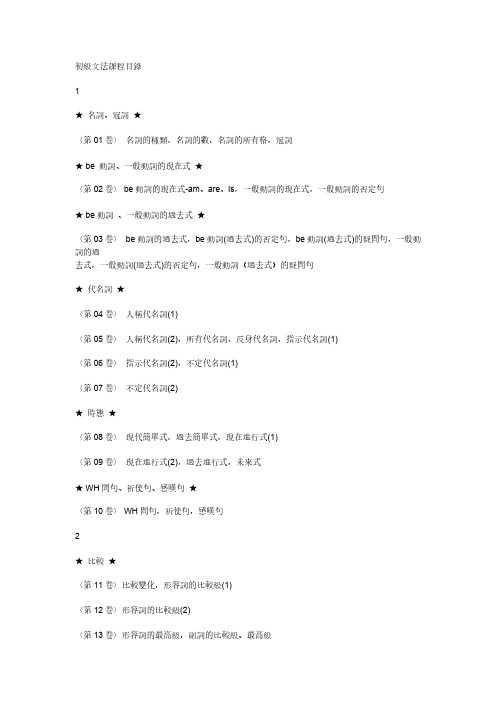
初級文法課程目錄1★名詞、冠詞★〈第01卷〉名詞的種類,名詞的數,名詞的所有格,冠詞★ be 動詞、一般動詞的現在式★〈第02卷〉 be動詞的現在式-am、are、is,一般動詞的現在式,一般動詞的否定句★ be動詞、一般動詞的過去式★〈第03卷〉be動詞的過去式,be動詞(過去式)的否定句,be動詞(過去式)的疑問句,一般動詞的過去式,一般動詞(過去式)的否定句,一般動詞(過去式)的疑問句★代名詞★〈第04卷〉人稱代名詞(1)〈第05卷〉人稱代名詞(2),所有代名詞,反身代名詞,指示代名詞(1)〈第06卷〉指示代名詞(2),不定代名詞(1)〈第07卷〉不定代名詞(2)★時態★〈第08卷〉現代簡單式,過去簡單式,現在進行式(1)〈第09卷〉現在進行式(2),過去進行式,未來式★ WH問句、祈使句、感嘆句★〈第10卷〉 WH問句,祈使句,感嘆句2★比較★〈第11卷〉比較變化,形容詞的比較級(1)〈第12卷〉形容詞的比較級(2)〈第13卷〉形容詞的最高級,副詞的比較級、最高級★不定詞(to V) ★〈第14卷〉不定詞(1) 〈第15卷〉不定詞(2) 〈第16卷〉不定詞(3) ★動名詞★〈第17卷〉動名詞(1) 〈第18卷〉動名詞(2) 〈第19卷〉動名詞(3) ★分詞★〈第20卷〉分詞(1) 〈第21卷〉分詞(2) 〈第22卷〉分詞(3) ★形容詞★〈第23卷〉形容詞(1) 〈第24卷〉形容詞(2) 〈第25卷〉形容詞(3) ★副詞★〈第26卷〉副詞(1) 〈第27卷〉副詞(2) 〈第28卷〉副詞(3) ★動詞★〈第29卷〉動詞(1) 〈第30卷〉動詞(2)3★現在完成式★〈第31卷〉現在完成式的形式→have/has+過去分詞,現在完成式的否定句及疑問句,現在完成式的使用時機(1)〈第32卷〉現在完成式的使用時機(2)〈第33卷〉現在完成式的使用時機(3)〈第34卷〉特別注意的現在完成式★附加問句★〈第35卷〉附加問句的形式,特別注意的附加問句(1)〈第36卷〉特別注意的附加問句(2)〈第37卷〉特別注意的附加問句(3)★被動語態★〈第38卷〉主動及被動,被動語態的形式→主詞+beV+過去分詞+by+行為者,主動及被動的轉換,各時態的被動語態形式(1)〈第39卷〉各時態的被動語態形式(2),各句型的被動語態形式(1)〈第40卷〉各句型的被動語態形式(2),特別注意的被動語態(1)〈第41卷〉特別注意的被動語態(2)〈第42卷〉特別注意的被動語態(3)★關係代名詞★〈第43卷〉關係代名詞的功用→連接詞+代名詞,關係代名詞的種類〈第44卷〉主格的關係代名詞(1)〈第45卷〉主格的關係代名詞(2),所有格的關係代名詞,受格的關係代名詞(1)〈第46卷〉受格的關係代名詞(2),特別注意的關係代名詞(1)〈第47卷〉特別注意的關係代名詞(2)〈第48卷〉特別注意的關係代名詞(3),修飾名詞的字、片語、子句★間接問句★〈第49卷〉直接問句及間接問句,間接問句的形成(1)〈第50卷〉間接問句的形成(2),特別注意的間接問句(1)〈第51卷〉特別注意的間接問句(2)★連接詞★〈第52卷〉連接詞的功能,連接詞總類(1)〈第53卷〉連接詞總類(2)〈第54卷〉連接詞總類(3)〈第55卷〉連接詞總類(4)〈第56卷〉連接詞總類(5)〈第57卷〉連接詞總類(6)★介系詞★〈第58卷〉介系詞的功能,表示時間的介系詞,表示地點的介系詞(1) 〈第59卷〉表示地點的介系詞(2)〈第60卷〉表示地點的介系詞(3),重要的介系詞中級文法課程目錄第一輯★不定詞★〈第01卷〉名詞用法(1)〈第02卷〉名詞用法(2)、形容詞用法〈第03卷〉副詞用法(1)〈第04卷〉副詞用法(2)、S+V+O+to V (1)〈第05卷〉S+V+O+to V (2)、S+V+O+原形不定詞、 S+V+it+C+to不定詞〈第06卷〉seem (happen…等)+to不定詞、be+不定詞(1)〈第07卷〉be+不定詞(2)、 不定詞的被動態,進行式,完成式不定詞〈第08卷〉特別注意的不定詞用法、不定詞的慣用表現★動名詞★〈第09卷〉動名詞的用法(1)〈第10卷〉動名詞的用法(2)、用不定詞/動名詞當受詞(1)〈第11卷〉用不定詞/動名詞當受詞(2)、動詞意義上的主詞(1)〈第12卷〉動詞意義上的主詞(2)、動名詞的否定形,被動態,完成 形、含動名詞的慣用表現(1)〈第13卷〉含動名詞的慣用表現(2)★假設語氣★〈第14卷〉假設法現在式、假設法過去式〈第15卷〉假設法過去完成式、假設法未來式(1)〈第16卷〉假設法未來式(2)、其他假設法的表現〈第17卷〉代替if子句的用法★否定★〈第18卷〉否定字的表現〈第19卷〉部分否定、雙重否定、否定的慣用表現(1)〈第20卷〉否定的慣用表現(2)、不用否定字的否定表現第二輯★句子的要素及種類★〈第01卷〉詞類、片語及子句(1)〈第02卷〉片語及子句(2)、句子的要素(1)〈第03卷〉句子的要素(2)〈第04卷〉句子的種類(1)〈第05卷〉句子的種類(2)★五大句型★〈第06卷〉第一句型S+V (1)〈第07卷〉第一句型S+V (2)、第二句型S+V+ C (1)〈第08卷〉第二句型S+V+C (2)〈第09卷〉第二句型S+V+C (3)、第三句型S+V+O (1)〈第10卷〉第三句型S+V+O (2)、第四句型S+V+O+O (1)〈第11卷〉第四句型S+V+O+O (2)、第五句型S+V+O+C (1)〈第12卷〉前半段第五句型S+V+O+C (2)★比較★〈第12卷〉後半段比較變化(1)〈第13卷〉比較變化(2)、原級(1)〈第14卷〉原級(2)〈第15卷〉原級(3)、比較級(1)〈第16卷〉比較級(2)〈第17卷〉比較級(3)、最高級★疑問★〈第18卷〉疑問代名詞〈第19卷〉疑問副詞、疑問形容詞、間接問句(1)〈第20卷〉間接問句(2)、附加問句、修辭疑問句、應答疑問句、 敘述句型的疑問句第三輯★名詞及冠詞★〈第01卷〉名詞(1)〈第02卷〉名詞(2)〈第03卷〉名詞(3)〈第04卷〉名詞(4)、名詞的複數形(1)〈第05卷〉名詞的複數形(2)、名詞的所有格(1)〈第06卷〉名詞的所有格(2)、冠詞(1)〈第07卷〉冠詞(2)、定冠詞的用法、冠詞特別注意的用法★介系詞★〈第08卷〉介系詞的受詞、介系詞的位置(1)〈第09卷〉介系詞的位置(2)、群體介系詞、雙重介系詞、 常見的介系詞用法(1)〈第10卷〉常見的介系詞用法(2)〈第11卷〉常見的介系詞用法(3)〈第12卷〉常見的介系詞用法(4)〈第13卷〉和形容詞,動詞結合的介系詞★關係詞★〈第14卷〉關係代名詞的種類和格、關係代名詞的用法(1)〈第15卷〉關係代名詞的用法(2)〈第16卷〉關係代名詞的用法(3)〈第17卷〉關係代名詞的用法(4)〈第18卷〉限定用法和非限定用法、關係副詞(1)〈第19卷〉關係副詞(2)、複合關係詞(1)〈第20卷〉複合關係詞(2)、關係形容詞及as, but, than第四輯★形容詞、副詞★〈第01卷〉形容詞(1)〈第02卷〉形容詞(2)〈第03卷〉形容詞(3)〈第04卷〉形容詞(4)〈第05卷〉形容詞(5)〈第06卷〉副詞(1)〈第07卷〉副詞(2)〈第08卷〉副詞(3)★分詞★〈第09卷〉修飾名詞的現在分詞、修飾名詞的過去分詞(1)〈第10卷〉修飾名詞的過去分詞(2)〈第11卷〉修飾名詞的過去分詞(3)、S+V.+C(分詞)、 S+V.+O+C(分詞) (1)〈第12卷〉S+V.+O+C(分詞) (2)、分詞構句(1)〈第13卷〉分詞構句(2)、分詞構句的被動態,完成形,否定形〈第14卷〉獨立分詞構句、with+(代)名詞+分詞、 分詞構句的慣用表現★被動語態★〈第15卷〉主被動語態轉換(1)〈第16卷〉主被動語態轉換(2)、第四句型(SVOO)的被動語態(1)〈第17卷〉第四句型(SVOO)的被動語態(2)、 第五句型(SVOC)的被動語態、疑問句的被動語態〈第18卷〉祈使句的被動語態、Say, believe, expect, know, think, consider等的被動語態、特別注意的被動語態(1)〈第19卷〉特別注意的被動語態(2)〈第20卷〉特別注意的被動語態(3)第五輯★助動詞★〈第01卷〉助動詞的特徵、助動詞的用法(1)〈第02卷〉助動詞的用法(2)〈第03卷〉助動詞的用法(3)〈第04卷〉助動詞的用法(4)〈第05卷〉助動詞的用法(5)、含助動詞的慣用表現★特殊構句★〈第06卷〉倒裝(1)〈第07卷〉倒裝(2)〈第08卷〉倒裝(3)、強調(1)〈第09卷〉強調(2)、省略(1)〈第10卷〉省略(2)〈第11卷〉省略(3)、插入、同位語★代名詞★〈第12卷〉人稱代名詞(1)〈第13卷〉人稱代名詞(2)〈第14卷〉人稱代名詞(3)〈第15卷〉人稱代名詞(4)、指示代名詞(1)〈第16卷〉指示代名詞(2)〈第17卷〉指示代名詞(3)、不定代名詞(1)〈第18卷〉不定代名詞(2)〈第19卷〉不定代名詞(3)〈第20卷〉不定代名詞(4)第六輯★時態★〈第01卷〉現在式(1)〈第02卷〉現在式(2)、過去式(1)〈第03卷〉過去式(2)、未來式、現在進行式(1)〈第04卷〉現在進行式(2)、過去進行式(1)〈第05卷〉過去進行式(2)、未來進行式、現在完成式(1)〈第06卷〉現在完成式(2)〈第07卷〉現在完成式(3)、過去完成式、未來完成式、完成進行式★時態的一致與敘述法★〈第08卷〉時態的一致(1)〈第09卷〉時態的一致(2)、敘述法(1)〈第10卷〉敘述法(2)〈第11卷〉敘述法(3)〈第12卷〉敘述法(4)〈第13卷〉敘述法(5)★連接詞★〈第14卷〉對等連接詞(1)〈第15卷〉對等連接詞(2)〈第16卷〉對等連接詞(3)、從屬連接詞(1)〈第17卷〉從屬連接詞(2)〈第18卷〉從屬連接詞(3)、各種從屬連接詞(副詞子句)的意義(1)〈第19卷〉各種從屬連接詞(副詞子句)的意義(2)〈第20卷〉各種從屬連接詞(副詞子句)的意義(3)。
- 1、下载文档前请自行甄别文档内容的完整性,平台不提供额外的编辑、内容补充、找答案等附加服务。
- 2、"仅部分预览"的文档,不可在线预览部分如存在完整性等问题,可反馈申请退款(可完整预览的文档不适用该条件!)。
- 3、如文档侵犯您的权益,请联系客服反馈,我们会尽快为您处理(人工客服工作时间:9:00-18:30)。
比较一. 比较变化1. 规则变化原级+er,est原级字尾有e+r,st短母音加子音>重复字尾+er,est 母音a,e,i,o,u子音+y>去y+ier,iestmore,most+多音节2. farther, furtherRome is farther from London than Paris is. Farther/further 表距离Did you get further information? Further['fə:ðə] 表程度3. latelater latest 时间latter last 顺序He got up later than usual.The latter part of the story was interesting.This is the latest news from America. latest news最新消息This is his last work.4. oldolder oldest 表年龄elder eldest 表长幼He is older than I.My elder(长辈)/older(老) brother is in Taipei.二. 原级比较1. Sports are as important as studies.He is as nice a person as his father.2. He does not work as/so hard as his brother (does).This Japanese-video game is not as/so expensive as the Taiwanese-one.3. She has as many dresses as her sister (does).I don’t know as many people as she (does).4. …times as…as…The bridge is twice as long as that one.=That bridge is half as long as this one.Imported books cost three times as much as Taiwanese books.cost v.价值Taiwanese books cost one tried as much as imported books.<注意>可以用length (long), width (wide),height (high),weight (heavy) ,depth (deep),size (large, big)This box is one quarter as large as that one.=This box is one quarter the size of that one.5. As…as possible/on e canCall the police as soon as possible/you can.as soon as possible (a.s.a.p)soon 时间快quick/quickly 速度快I told him to come home as early as possible/he could.As…as 惯用片语as busy as a bee 非常忙碌as cool as a cucumber 极端冷静as cunning as a fox 十分狡猾cunning ['kʌniŋ] adj. 狡猾的;可爱的;巧妙的as dead as a doornail 了无声息/完全(或肯定、确实无疑地)死了的,确已僵死了的doornail ['dɔ:nei] n. 门钉,大头钉子nail n. 指甲;钉子as flat as a pancakeflat [flæt] adj. 平坦的pancake ['pænkeik] n. 煎饼as sweet as honey 非常甜美as like as two peaspea [pi:] n. [植]豌豆特殊句型6. Not so much… as… 与其说…不如说…It was not so much a crime as a mistake.=It was rather a mistake than a crime.=It was a mistake rather than a crime.7. Not so much as…/without so much as… 连…也没有The man didn’t so much as apologize to me.didn’t apo logize 用原形He left me without so much as saying thanks.without saying 用VIng8. As…as ever 依然She looks as happy as everHe is as great an artist as ever lived.everDid you ever go fishing? 你曾经钓过鱼吗?Do you ever go fishing (in you free time)? 你平常钓鱼吗?9. A s…as any+单数名词和任何人一样He is as hardworking as any (person) in the village.person 可省10. As many/much as+数词多达…As many as fifty thousand birds spend the winter here.I paid as much as 200 dollars for this sweater.11. “多达”的其他表现Radio broadcasting started as early as 1920.He goes to movies as often as three times a month.12. As many/much… 同数的,同量的I found six mistakes in as many lines.The tour group visited five cities in as many days.13. As good as… 几乎等于… 非褒义This house is a great buy. It’s as good as n ew.This house is a great buy. 买对了His car is as good as a piece of junk. 像垃圾一样垃圾贬义三. 比较级比较1. ThanDogs are cleverer than cats.表全体狗: a dog/dogsShe can speak English better than I/me/I can. 副词比较级2. …the 比较级of the two 两者中较This guitar is the better of the two.3. 强调比较级much/many, even, far, by far, far and away, a lot/lots, ~得多still, 更加地a good deal, a great deal, 相当地somewhat rather, 稍微a bit, a little bit, a little 一点点large 容量大big 体积大大份薯条用large1. His house is much larger than mine.“大”是抽象用much强调2. You will find many more amusements in big cities than small towns.“游乐场”是可数用many强调4. 劣等比较~less 原级than ~ ~比~较不Going by bus is less expensive than going by taxi.=Going by bus is not as expensive as going by taxi.=Going by taxi is more expensive than going by bus.Instant noodles are less nutritious than rice.instant food 速熟食品fast food 速买食品5. 省略thanI have to study English harder this year because I’m a third yearstudent. 三年级学生Why don’t you use a sharper knife?重要表现6. More~than… 与其…不如~She was more sad than angry.她是难过It is more flattery than praise.与其说是称赞不如说是讨好形容词不管是单音节或多音节,都用more+adj.形式flattery ['flætəri]7. 比较级and比较级越来越…It’s getting darker and darker.Entrance exams are becoming more and more difficult.8. The 比较级…,the比较级… 越…就越…The order we grow, the weaker our memory becomes.The longer I waited, the less patient I become.The more we get together, the happier we will be.The more time you have, the more work you can do.9. (all)the比较级for+名词/because~ 因为~因此便….We respect him (all) the more for his honesty.We respect him (all) the more because he is honest.因为诚实我们更尊敬他She works all the harder because she is a mother.因为身为人母,他更努力工作.注意负面时He worked none the harder because he became a father.虽说成为父亲但并不代表会更努力工作.None the比较级for+名词/because~ 因为~因此便….10. Much less… 更不用说I don’t like mathematics, much less physics.Mathematics is hard. 一个科目,单数名词The old man cannot even work, much less run.11. Superior to~, senior to~本身含有比较含有的单词,不可用than,改用toSuperior, inferior 优秀的,拙劣的[sju:'piriə] [in'fiəriə]My inferiors 我的晚辈Senior, junior 年长的,年幼的Major, minor (程度)较大的,较小的['mainə]Prior, posterior 前面的,后面的['praiə] [pɔ'stiəriə]Postwar 战后He is five years older than I=He is five years senior to me.=He is senior to me by five years.I prefer playing sports to watching them.Prefer 动词哦12. More or less, sooner or laterOur guess was more or less correct.more or less adv.多多少少Sooner or later you will find your missing child.13. Know better than~(toVR) 不会傻到Had better~(VR) 最好~I know better than to go sailing without a life jacket.You had better not go.14. No more than等no和notI have no money.I don’t have any money.No=not any1. No more than = only 只有~而已I have no more than 100 dollars.我有100元,再没有其他了>只有2. Not more than = at most 顶多~I have not more than 100 dollars.我没有更多100元>顶多3. No less than = as much as 有~之多I have no less than 100 dollars.我有100元,再没有更少的了>我有100耶!4. Not less than = at least 至少I have not less than 100 dollars.我没有少于100元.>至少15. No more~ than~ 等1. No more~ than~ 和~一样不I am no more mad than you are.我和你一样少疯>不疯2. Not more~ than~ 不像~那样~I am not more mad than you are.我不比你多疯>没你疯3. No less~ than~ 与~同样地~I am no less mad than you are.我和你一样多疯>很疯4. Not less~ than~ 与~有过之而无不及I am not less mad than you are我不比你少疯>半斤&八两四. 最高级A. 最高级+in~/of~/that+S+V1. February is the shortest of all the months.2. He drives (the) most carefully of us all.副词最高级the常省3. This is the finest view that I’ve ever seen.4. Picasso is one of the most famous painters of the 20th century.毕加索5. This is the tried most popular song in the hit chart this week.最受欢迎中的第三B. 强调最高级Very, much, by far, far and away1. She is much/by far/far and away the best singer in the country.She is the very best singer in the country.C. The的省略1. 同一人事物不加theThis lake is the deepest in Japan.This lake is deepest here. 此湖这里最深The air in this area is the cleanest in Japan.The air in this area is cleanest when the factories are closed.2. 叙述用法不加theI am happy. 叙述用法I am a happy girl. 补述用法补了happyI feel happ iest when I’m with my friend.也可理解为同一人不加theD. 三级互换Bob is more handsome than any other boy in my class.=No other boy in my class is more handsome than Bob.=No other boy in my class is as handsome as Bob.因为我们班包括Bob所以加other重要表现E. Even+最高级甚至连…1. Even the richest man in the world can’t buy her heart.2. Even the most talented student in our class wasn’t able to answer it.F. At best/at the best, at most/at the most 顶多It will take at (the) most/best three hours to reach out destination.注意at one’s be atThe plum blossoms there are now at their best.bloom [blu:m] .n :花in bloom 盛开(指花). v :1.看上去很健康例:Jane is positively blooming with health these days.简这些日子以来身体确实健康起来2.开花。
